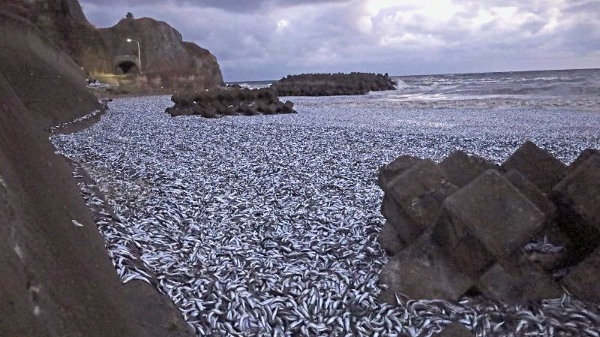image1
Sardines and mackerels are seen washed up on a beach in Hakodate, Hokkaido, northern Japan, on December 7, 2023. (Photo by Kyodo News)
Unprecedented 1,200 tons of fish have washed ashore in Japanís Hokkaido for an "unknown" reason, Japanese officials say.
Baffled authorities said the dead sardines and mackerel had washed ashore in two locations near the fishing port in the northernmost of Japanís main islands in recent days.
Officials of Hakodate have not yet determined the reason behind the calamity, which formed a silver blanket of dead fish stretching for more than a kilometer. They stressed in a notice to residents that the cause of the incident is unknown, warning residents not to consume the fish.
In Nakiri, a town on the Pacific coast hundreds of miles south of Hokkaido, officials were confronted with 30 to 40 tons of dead Japanese scaled sardines, or sappa, which had been observed in the area a couple of days earlier.
"Iíve never seen anything like this before. It was only around last year that we began to catch sappa in Nakiri. It makes me wonder if the marine ecosystem is changing," a veteran fisherman told Japanís Mainichi Shimbun daily.
According to some experts, the migratory fish in both locations had become stranded after being chased to the point of exhaustion by amberjack and other predatory fish.
"The cause is unknown at the moment. We plan to sample the seawater at the site and examine it to uncover the cause," Mikine Fujiwara, a local fisheries official, told the newspaper.
Earlier, the British newspaper the Daily Mail speculated in a report that there might be a link between the mass mortality and the release of wastewater from the melted-down Fukushima Daiichi nuclear power plant. However, Japanese government officials strongly rejected the speculation.
"There have been no abnormalities found in the results of water-monitoring surveys," the Fisheries Agency said in response to the report by the British tabloid. "We are concerned about the proliferation of information that is not based on scientific evidence."
This is while Japanese fishing organizations strongly oppose Fukushimaís water release, saying it would damage the reputation of their seafood as the industry struggles to recover.











